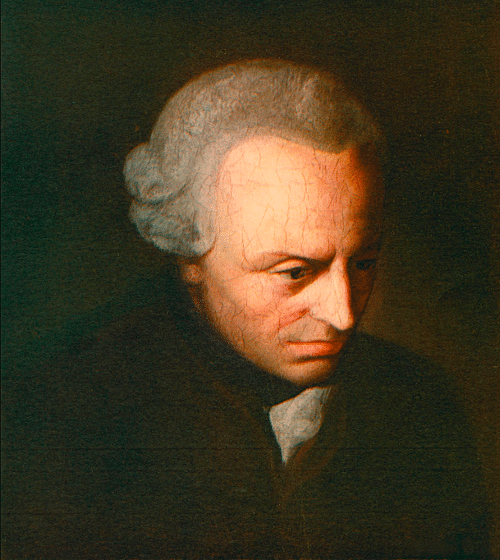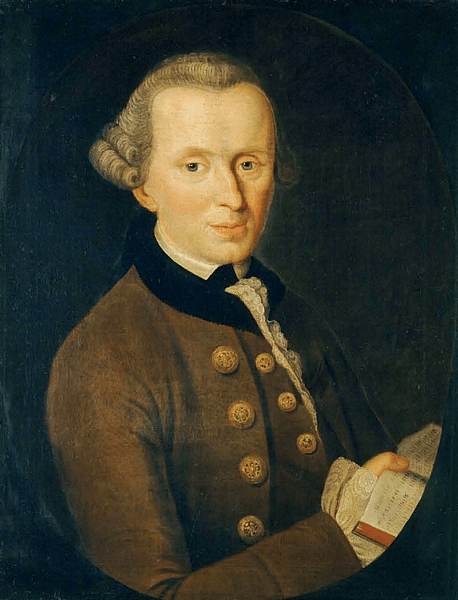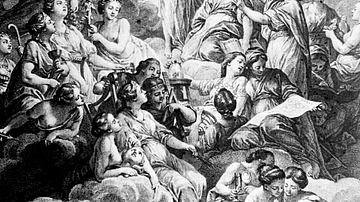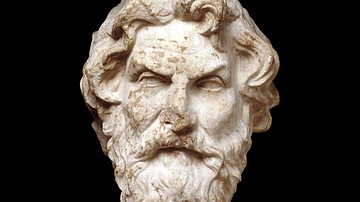
Immanuel Kant (1724-1804) was a German Enlightenment thinker who is widely regarded as one of the most important philosophers of any period. His most famous works of critical philosophy include The Critique of Pure Reason, which challenged the dominance of empiricism and rationalism in Enlightenment thought and shifted the focus of philosophy to an examination of general concepts and categories.
Early Life
Immanuel Kant was born in Königsberg, East Prussia (today's Kaliningrad, Russia) on 22 April 1724. His parents, both Pietist Lutherans, were possibly of Scottish descent. His father earned a modest living as a maker of harnesses and saddles, but Immanuel had the opportunity to further his education thanks to a priest who recognised his early intellectual talent. Aged 16, Kant began to study at the University of Königsberg, starting with theology. Kant graduated in 1746 and worked as a private tutor for several different families for most of the next decade. He returned to his old university and gained a master's degree in 1755. Acquiring a license as a Privatdozent, he continued to eke out a living teaching more academic subjects, which included mathematics, natural sciences, and history to private students. His fortunes improved significantly in 1770 when he secured a professorship of logic and metaphysics at the University of Königsberg, a position he would hold until 1796. Kant went on to become the rector of the university.
Character
Kant lived a remarkably quiet life of study and teaching, as here summarised by the historian H. Chisick:
Kant was not only a profound and original thinker, but also an articulate and popular teacher. He lived a highly disciplined private life, devoting fixed and long hours to study, but he also valued company, and was socially accomplished.
(238)
S. Blackburn notes that "his life was orderly to the point of caricature" (258). Locals in Königsberg were even said to set their timepieces to the regularity of Kant's daily walks. Kant never married and he spent all his life in Königsberg.
A Trio of Critiques
Kant had always been interested in philosophy, a subject he taught to his students. He greatly admired the Scottish philosopher David Hume (1711-1776), whose work Kant said had woken him from his "dogmatic slumber" (Gottlieb, 196). Kant was also an admirer of the Swiss philosopher Jean-Jacques Rousseau (1712-1778); he had a single picture in his study, and it was a portrait of Rousseau.
Kant's first publication of his own came in 1763 with his The Only Possible Ground for Demonstration of the Existence of God. Kant, even after a long career of philosophical enquiry, returned to the subject of theology in 1793 with his Religion Within the Bounds of Pure Reason. In 1775, Kant published a treatise on natural science, his Universal Natural History and Theory of the Heavens, but his first major work of philosophy came in 1781, The Critique of Pure Reason, which covered his views on the intellectual battle between metaphysics and rationalism. This was joined in 1788 by The Critique of Practical Reason, which dealt with ethics, and in 1790 by The Critique of Judgement, which covered Kant's thoughts on aesthetics.
Perhaps Kant's most significant contribution to Enlightenment thought was to challenge the hitherto dominance of empiricism, that is the reduction in importance of metaphysics based on the belief that thinkers should focus on facts and measurements which are based on sensory experience, that is, the physical world around us. Enlightened thinkers, in reaction to the long-held dominance of religious views in Western thought, had discarded many metaphysical topics as unworthy of enquiry because they believed that provable answers could never be found to certain questions like "Does God exist?" and "Why is the universe made in the way it is?" Thinkers were now looking for certainty. Kant agreed in part with this empirical approach to knowledge, but in his Critique of Pure Reason, he proposes that full sensory experience and sensation can never be fully realised; all we can do is experience aspects of "things in themselves". In other words, even the empiricists had a dubious claim to absolute certainty.
Kant believed that some knowledge must be independent of sensation, examples given include our concepts of space and time, freedom (in the sense of choice and intention), immortality, and God. These things are a priori knowledge, things that we can think about without ever experiencing them directly, things that our minds can impose upon our experiences. Indeed, Kant goes so far as to say that experience without these a priori ideas is impossible. "Kant thus restored metaphysics to a central place in philosophy" (Chisick, 239), even if he himself believed that a metaphysician must be very careful not to waste time investigating what he called the noumenal world, the world beyond the sensory world that can never be known with certainty.
Kant's thoughts on a priori knowledge led Western philosophy to the dark conclusion that these "indubitably knowable, a priori truths are based on our own, ultimately arbitrary, rules or habits of using words and symbols, and give no information about the world" (Berlin, 180). Philosophy was obliged to turn in on itself and critically examine the general terms and concepts being used to articulate the answers to age-old questions of enquiry. In short, the method of finding answers had become just as complex as the answers themselves. In this way, philosophy had become starkly different from science.
Kant on Ethics
There was a significant consequence for ethics of Kant's thoughts on the importance of metaphysics. A purely empirical explanation of the world places humans as merely reactive to external events, a biological organism only. Kant wished to emphasise that because humans can think for themselves then so they are their own moral agents in possession of a "free causality" (Yolton, 262) who can act upon and influence the world of senses around them. Kant also believed that moral judgements are based on reason and not feelings as some other thinkers suggested.
Another important aspect of Kant's ethics is that moral worth comes from a person's intentions and not from the results of their actions, which could be accidental and unintended (for example, giving money to a beggar so that they can buy food, but the beggar then uses it to buy harmful drugs). We should have good intentions because of our sense of moral duty, which is based on reason, which, in turn, provides us with maxims to follow like "treat others as you yourself would like to be treated". Kant suggested that these maxims are actually "categorical imperatives", there are no conditions, no ifs and buts, again because the consequences are always irrelevant. Another example of a moral imperative is "do not steal", that is, in any circumstances. A person cannot say to themselves "It is ok to steal because I am desperate right now" or "It is ok to steal because I do not think I will be caught this time." Kant suggested that we can test if a maxim is worthy of following by asking if it is universal, that is, if everyone should follow it. In this way, the maxim "never steal" passes the test while "stealing is ok sometimes" does not. Kant famously wrote:
There is therefore but one categorical imperative, namely this: act only on that maxim whereby thou canst at the same time will that it should become a universal law.
(Popkin, 46)
Another of Kant's tests for a maxim's validity is to determine that an action does not use other people merely as a means to an end because everyone is a rational being and everyone is equal. He wrote:
So act as to treat humanity, whether in thine own person or in that of any other, in every case as an end withal, never as a means only.
(ibid)
Kant recognised that good moral behaviour may not bring its own rewards (plenty of dishonest people do well in life), but he used this as an argument for the afterlife since that must be when good moral behaviour is truly rewarded.
Criticism of Kant
Critics of Kant's motivist ethical theory point out that he allows no exceptions to his maxims (one might lie to save one's life or the life of someone else, for example). A second criticism is that two maxims may be in conflict, and so the moral agent does not know which action to take (for example, to lie to protect a promise previously made to keep a secret: one must either break the promise or tell a lie). A third criticism is that Kant's system excludes emotion from how people decide which actions they take. A fourth criticism is that Kant, in using the argument "What if everyone did this?" as a judgment of the moral validity of an action, seems to be ignoring his own advice not to consider the consequences of actions and tie moral actions exclusively to intentions.
Peace Between Nations
In more practical political affairs, Kant believed that states should encourage religious toleration. He also firmly believed in a wider toleration of ideas and that "freedom of the pen is the only safeguard of the rights of the people" (Robertson, 395). Kant advocated education for all so that each individual in society may learn to think for themselves regardless of social status.
Regarding international politics, Kant firmly believed that only through a unification of interests in a confederation of nations could lasting peace be achieved, what he called "a universal cosmopolitan existence" (Cameron, 22). Kant realised that societies typically progress through conflict and sometimes violence because of what he called humanity's inherent "unsociable sociability" (Robertson, 683) but he also argued that states must eventually be obliged to mutually cooperate and form a unified will just as individuals had done to leave behind the disadvantages of the state of nature and form political societies. States, although remaining independent nations, had to find a way to cooperate to create a perpetual peace. For these reasons, he was against standing armies and the brutalities of colonialism, although he thought Europeans could settle in new continents, provided they made treaties that respected the existing way of life of indigenous peoples whom (except in his early writings) he considered as equal in rights to the colonisers. All of these ideas were set forth in his essay Perpetual Peace, published in 1795.
Kant's Major Works
The most important works by Immanuel Kant include:
The Only Possible Ground for Demonstration of the Existence of God (1763)
Universal Natural History and Theory of the Heavens (1775)
The Critique of Pure Reason (1781)
Prolegomena to Any Future Metaphysics (1783)
What is Enlightenment? (1784)
Fundamental Principles of the Metaphysics of Ethics (1785)
Metaphysical Foundations of Natural Science (1786)
The Critique of Practical Reason (1788)
The Critique of Judgement (1790)
Religion Within the Bounds of Pure Reason (1793)
Perpetual Peace (1795)
The Metaphysics of Morals (1797)
Death & Legacy
Immanuel Kant suffered from senile dementia in his later years. He died in Königsberg on 12 February 1804 and was entombed in the city's cathedral. Chisick describes Kant as "probably the most important and influential philosopher of the 18th century" (217), and this despite "the notorious difficulty of reading Kant, made worse by his penchant for scholastic systematization and obscure terminology" (Blackburn, 260). Indeed, the difficulty of determining what exactly Kant said in his work may explain why "the full Kantian philosophy…was known to very few men in the eighteenth century" (Hampson, 196).
Kant's critical philosophy may have taken time to embed itself into European thought, but he had shown that there was a defensible middle ground between the two extremes of empiricism and rationalism, which had hitherto fractured philosophy. In so doing, Kant did nothing less than give philosophy a whole new direction and, as a guide to those who followed him, the bold encouragement: "Sapere aude! Have courage to use your own understanding!" (Robertson, 30).









